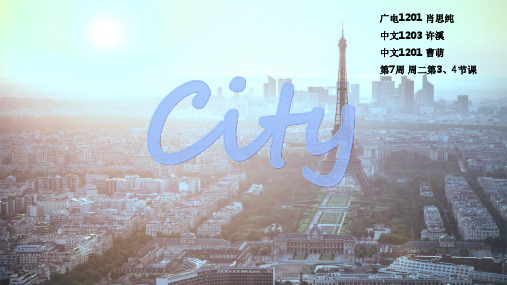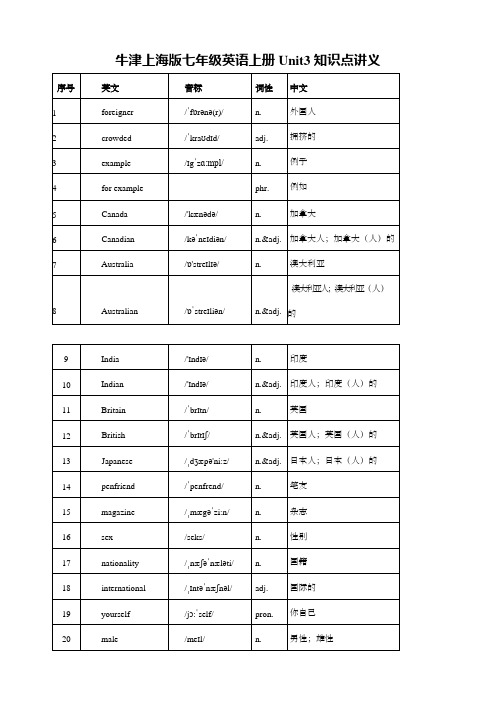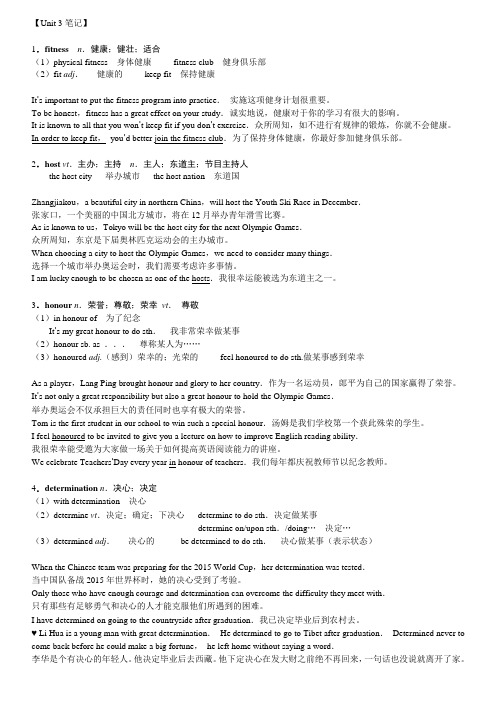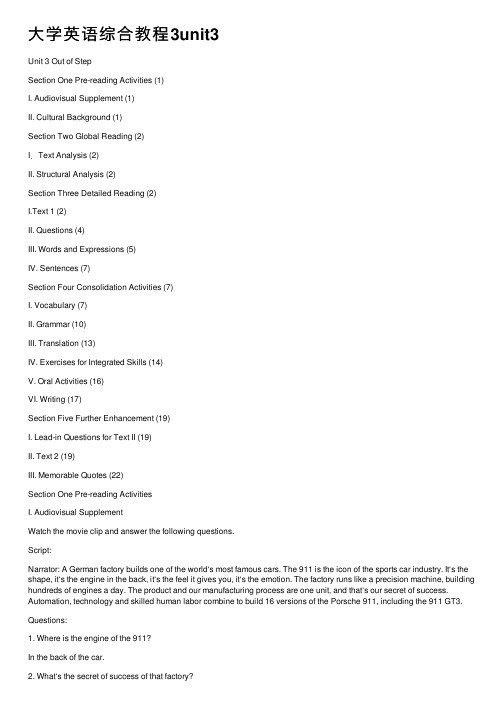Unit3 City and Country(1)
北师大版英语必修一Unit1 lesson4 city and country课件 (共14张PPT)

Homework:
Read the articles again and prepare for the debate: Which lifestyle do you think is better, Debbie's or Paul's? Group 1: I think Debbie's lifestyle is better. Group 2: I think Paul's lifestyle is better.
Careful-reading Task 3 Read the articles carefully and fill in the table in exercise 4 with detailed information.
Lives in Wake-up time Job Working hours Works in Evening activities
Debbie Paul a big city a small village 4 am 7 am a farmer an accountant all day 8 differences center of London north of England dance classes, go to the gym, French classes play with his children; study by distance learning
…
Can you imagine city and country lifestyles in Britian?
City-and-Country教学详案

教学详案Unit 1 LifestylesLesson 4 (Reading): City and Country安徽省霍山中学刘兵Name: Liu BingSchool: Anhui Huoshan Middle SchoolClass: Class9 Senior1Subject: EnglishTeaching Contents:Unit 1 LifestylesLesson 4(Reading): City and CountryTeaching Contents:Lesson 4 (Reading): City and CountryUnit 1 Lifestyles Module1by Beijing Normal University Press[ 全日制普通高中课程标准实验教科书(必修模块)北师大版高一英语模块1第一单元《生活方式》的第四课(阅读)《城市和乡村》]I. Analysis of the teaching contentsSuch is a reading lesson. This text consists of two passages, eitherof which is a narrative. The biggest characteristic of the narrative isto develop the text chronologically. This text perfectly reflects the characteristics of narrative. The two articles according to time cues canbe clearly divided into three parts: during the daytime, in the evening,on the weekend. At the same time, we can also develop the qualities ofstudents to compare the two different lifestyles, , which carries outemotional education to students.II. Design of Teaching Objectives1. Knowledge objectives1).Vocabulary: accountant, tube, crowded, nearby, otherwise, crowd forecast, lung, distance, sickness, cigar2).Phrase: by/before/towards nine o’clock, so that, such that, take careof, free of charge, look forward to,3).Grammar:(stress) This is+ adj.+ what/who/where; so+ that; such +that2. Ability objectives1).Listening skills :understand what the teacher's saying.2).Reading skills :general understanding,detail information,judge3).Speaking skills: use the new expressions to make a sentence4).writing skills:write a short passage on your ideal life in the cityor in the countryside with new words and expressions learned3. Emotion objectiveshealthy lifestyle, how do you make your life in a city or in a villagebetter. Enjoy your own life rather than envy others’.Ⅲ. Teaching Important Points1. Learn and use the words and phrases listed above.2. Enable the students to improve their reading comprehension.3. Enable the students to make good use of reading strategies.Ⅳ. Teaching Difficult Points1. How to help the students understand the passage better.2. How to help the students improve the cross cultural awareness.Ⅴ. Teaching Methods1. Task-based method to make students interested in what they will learn.2. Fast reading to get the general idea of the passage.3. Careful reading to get some detailed information.4. Deep understanding to consolidate what we have learnt.Ⅵ. Teaching Aids:1. A blackboard2. A computer for multimediaⅦ. Teaching Procedures:StepⅠLead in (3 minutes)Task1 Free talk1)Where did you spend your summer vacation?2)Can you describe your life there?Show some pictures in the country and in the city.教师活动:Show some pictures about City and Country.T: ① Seeing the picture, what life do you think people are living?② When you talk about the city life or country life, what will you occur into your mind?学生活动:Describe what you see and feel in the picture.设计目的:激发学生的学习兴趣,让学生主动参与,自然导入到新情境。
流畅英语口语 UNIT3《 City》 讲课PPT

About tourism
Paris is a historic city of the world, there are plenty of attractions, the Eiffel Tower, Arc de Triomphe, the Elysee Palace, the Palace of Versailles, the Louvre, the Place de la Concorde, Notre Dame de Paris, the Georges Pompidou Center, and other cultural and arts,UNESCO, the Organization for Economic Cooperation and Development and other international organizations, the headquarters are located in Paris.
Which is the world’s largest capital city?
Which is Europe’s noisiest captial city?
Which is the world’s oldest city?
Which is the world’s highest capital city?
广电1201 肖思纯
中文1203 许溪 中文1201 曹萌 第7周 周二第3、4节课
WHAT IS THE CITY?
City is a central area of politics, economy, culture,transportation, communications etc.
Beijing , also known as Peking , is the capital of the People‘s Republic of China and one of the most populous cities in the world. The city is the country’s political, cultural, and educational center, and home to the headquarters(总部) for most of China‘s largest state-owned companies(国有企业).
牛津上海版七年级英语上册Unit3知识点讲义

牛津上海版七年级英语上册Unit3知识点讲义知识点梳理eful words and expressions1. Garden City is a crowded city.➢be crowded with=be full of2. Over six million people live in Garden City.➢over =more than➢当表示确切的数目时,hundred, thousand, million等数词前用单数形式。
当表达不具体的数目,如成百上千,成千上万等时,hundrend, thousand等数词用复数形式,且在其后加介词of。
[e.g.] Hundred of visitors came to Shanghai every year.3. For example, there are more than twenty-eight thousand people from Canada in Garden city.➢for example一般只举同类人或物中的“一个”为例,作插入语,用逗号隔开,可置于句首、句中、句末。
[e.g.] Noise,for example,is a kind of pollution.4. —What do we call people from Canada?— We call them Canadians.➢call意为“把…称作”➢注意国家和国籍的不同表达:[e.g.] He is a boy from Canada. = The boy comes from Canada. = The boy is Canadian.➢本课已出现的及常见的国名、国籍和国名列表如下:5. Nowadays we can visit countries near or far away from China.➢near作形容词,表示1)"邻近的,接近的"。
高中英语人教版必修一:Unit 3单元笔记

【Unit 3笔记】1.fitness n.健康;健壮;适合(1)physical fitness身体健康fitness club健身俱乐部(2)fit adj.健康的keep fit保持健康It's important to put the fitness program into practice.实施这项健身计划很重要。
To be honest,fitness has a great effect on your study.诚实地说,健康对于你的学习有很大的影响。
It is known to all that you won't keep fit if you don't exercise.众所周知,如不进行有规律的锻炼,你就不会健康。
In order to keep fit,you'd better join the fitness club.为了保持身体健康,你最好参加健身俱乐部。
2.host vt.主办;主持n.主人;东道主;节目主持人the host city举办城市the host nation东道国Zhangjiakou,a beautiful city in northern China,will host the Youth Ski Race in December.张家口,一个美丽的中国北方城市,将在12月举办青年滑雪比赛。
As is known to us,Tokyo will be the host city for the next Olympic Games.众所周知,东京是下届奥林匹克运动会的主办城市。
When choosing a city to host the Olympic Games,we need to consider many things.选择一个城市举办奥运会时,我们需要考虑许多事情。
I am lucky enough to be chosen as one of the hosts.我很幸运能被选为东道主之一。
全新版大学英语(第二版)综合教程3课文原文及翻译Until1(8较完整)-

全新版大学英语(第二版)综合教程3课文原文及翻译Until1(8较完整)-1 / 54目录Unit1 Text A Mr. Doherty Builds His Dream Life ............................................................................. 1 Unit1 Text B American Family Life: The Changing Picture ................................................. 4 Unit2 Text A The Freedom Givers (10)Unit3 Text A The Land of the Lock (14)Unit3 Text B Why I Bought A Gun ......................................................................................... 16 Unit4 Text A Was Einstein a Space Alien? ..................................................................................... 21 Unit5 Text A Writing Three Thank-You Letters ............................................................................. 25 Unit6 Text A The Last Leaf...............................................................................................................28 Unit7 Text A Life of a Salesman (33)Unit7 Text B Bricklayer’sBoy (41)Unit8 Text A Human Cloning: A Scientist’s Story ......................................................... 47 Unit8 Text B Second Thoughts on Cloning .. (50)Unit1 Text A Mr. Doherty Builds His Dream Life多尔蒂先生创建自己的理想生活吉姆·多尔蒂Jim Doherty1 There are two things I have always wanted to do -- write and live on a farm. Today I’m doing both. I am not in E. B. White’s class as a writer or in my neighbors’ league as a farmer, but I’m getting by. And after years of frustration with city and suburban living, my wife Sandy and I have finally found contentment here in the country.有两件事是我一直想做的――写作与务农。
人文英语4(unit 1-5)

【句子】 We do for the live cable TV programs.
【译文】我们的直播有线电视节目需要电视收视许可证。
【难点】这里的 do 指上句话中的 need,意为“需要”。单词 live 此处是形容词,意为 “直播的”。 cable 电缆。例如: They run commercials on cable systems across the country. 他们在遍布全国的有线电视网做广告。
too, in heaven, in the world, in hell, on earth 等表示强调。例如:
His behavior is in every way perfect.
:BBS1113
精选ppt课件
13
Listening and Speaking——Task 4
Listen to the dialog and decide whether the following statements are TRUE (T)or FALSE (F).
()
He is often called England’s national poet, and the “Bard of Avon”. His extant works, including collaborations, consist of approximately 38 plays, 154 sonnets, two long narrative poems, and a few other verses, some of uncertain authorship. His plays have been translated into every major living language and are performed more often than those of any other playwright.
大学英语综合教程3unit3

⼤学英语综合教程3unit3Unit 3 Out of StepSection One Pre-reading Activities (1)I. Audiovisual Supplement (1)II. Cultural Background (1)Section Two Global Reading (2)I.Text Analysis (2)II. Structural Analysis (2)Section Three Detailed Reading (2)I.Text 1 (2)II. Questions (4)III. Words and Expressions (5)IV. Sentences (7)Section Four Consolidation Activities (7)I. Vocabulary (7)II. Grammar (10)III. Translation (13)IV. Exercises for Integrated Skills (14)V. Oral Activities (16)VI. Writing (17)Section Five Further Enhancement (19)I. Lead-in Questions for Text II (19)II. Text 2 (19)III. Memorable Quotes (22)Section One Pre-reading ActivitiesI. Audiovisual SupplementWatch the movie clip and answer the following questions.Script:Narrator: A German factory builds one of the world‘s most famous cars. The 911 is the icon of the sports car industry. It‘s the shape, it‘s the engine in the back, it‘s the feel it gives you, it‘s the emotion. The factory runs like a precision machine, building hundreds of engines a day. The product and our manufacturing process are one unit, and that‘s our secret of success. Automation, technology and skilled human labor combine to build 16 versions of the Porsche 911, including the 911 GT3.Questions:1. Where is the engine of the 911?In the back of the car.2. What‘s the secret of success of that factory?The product and their manufacturing process are one unit. Automation, technology and skilled human labor combine to build the Porsche 911. And the factory runs like a precision machine.II. Cultural Background1. Car culture has been a major niche lifestyle in America.2. In the 1950s, the post-war boom produced a generation of teenagers with enough income to buy their own cars. These cars became so much more than just modes of transportation. They were reflections of a lifestyle. The ability to tune and soup-up muscle cars gave average Joes the opportunity to show off their power, their speed and their style in a way that personified the car as character.3. Like Granny in Jan and Dean's 1964 song ―The Little Old Lady from Pasadena,‖ we can't keep our foot off the accelerator.4. We are crazy about our cars —and always have been. ―The American,‖William Faulkner lamented in 1948, ―really loves nothing but his automobile.‖5. We dream of cars as we dream of lovers.6. Americans have always cherished personal freedom and mobility, rugged individualism and masculine force.Section Two Global ReadingI.Text AnalysisMain Idea―Out of Step‖ is an exposition that presents the absurdity of the Americans‘ dependence on cars. The Americans, being so accustomed to using cars, have almost forgotten the existence of their legs. Wherever they go, they go in their cars. As a result, pedestrian facilities are neglected in city planning or rejected by the inhabitants.II. Structural AnalysisParagraph 1-6 The writer introduces his idea with an anecdote.Paragraphs 7-13 In this part, the author presents the fact that the Americans are habituated to using cars for everything. Paragraphs 14-20 In this part, the author explains that pedestrian facilities are neglected or discarded.Section Three Detailed ReadingI.Text 1Out of StepBill Bryson1After living in England for 20 years, my wife and I decided to move back to the United States. We wanted to live in a town small enough that we could walk to the business district, and settled on Hanover, N.H., a typical New England town —pleasant, sedate and compact. It has a broad central green surrounded by the venerable buildings of Dartmouth College, an old-fashioned Main Street and leafy residential neighborhoods.2It is, in short, an agreeable, easy place to go about one‘s business on foot, and yet as far as I can tell, virtually no one does.3Nearly every day, I walk to the post office or library or bookstore, and sometimes, if I am feeling particularly debonair, I stop at Rosey Jekes Caféfor a cappuccino. Occasionally, in the evenings, my wife and I stroll up to the Nugget Theatre for a movie or to Murphy‘s on the Green for a beer, I wouldn‘t dream of going to any of these places by car. People have gotten used to my eccentric behavior, but in the early days acquaintances would often pull up to the curb and ask if I wanted a ride.4―I‘m going your way,‖ they would insist when I politely declined. ―Really, it‘s no bother.‖5―Honestly, I enjoy walking.‖6―Well, if you‘re sure,‖ they would say and depart reluctantly, even guiltily, as if leaving the scene of an accident without giving their name.7In the United States we have become so habituated to using the car for everything that it doesn‘t occur to us to unfurl our legs and see what those lower limbs can do. We have reached an age where college students expect to drive between classes, where parents will drive three blocks to pick up their children from a friend‘s house, where the letter carrier takes his van up and down every driveway on a street.8We will go through the most extraordinary contortions to save ourselves from walking. Sometimes it‘s almost ludicrous. The other day I was waiting to bring home one of my children from a piano lesson when a car stopped outside a post office, and a man about my age popped out and dashed inside. He was in the post office for about three or four minutes, and then came out, got in the car and drove exactly 16 feet (I had nothing better to do, so I paced it off) to the general store6 next door.9And the thing is, this man looked really fit. I‘m sure he jogs extravagant distances and plays squash and does all kinds of healthful things, but I am just as sure that he drives to each of these undertakings.10An acquaintance of ours was complaining the other day about the difficulty of finding a place to park outside the local gymnasium. She goes there several times a week to walk on a treadmill. The gymnasium is, at most, a six-minute walk from her front door.11I asked her why she didn‘t walk to the gym and do six minutes less on the treadmill.12She looked at me as if I were tragically simple-minded and said, ―But I have a program for the treadmill. It records my distance and speed and calorie burn rate, and I can adjust it for degree of difficulty.‖13I confess it had not occurred to me how thoughtlessly deficient nature is in this regard.14According to a concerned and faintly horrified 1997 editorial in the Boston Globe, the United States spent less than one percent of its transportation budget on facilities for pedestrians. Actually, I‘m surprised it was that much. Go to almost any suburb developed in the last 30 years, and you will not find a sidewalk anywhere. Often you won‘t find a single pedestrian crossing.15I had this brought home to me one summer when we were driving across Maine and stopped for coffee in one of those endless zones of shopping malls, motels, gas stations and fast-food places. I noticed there was a bookstore across the street, so I decided to skip coffee and head over.16Although the bookshop was no more than 70 or 80 feet away, I discovered that there was no way to cross on foot without dodging over six lanes of swiftly moving traffic. In the end, I had to get in our car and drive across.17At the time, it seemed ridiculous and exasperating, but afterward I realized that I was possibly the only person ever to have entertained the notion of negotiating that intersection on foot.18The fact is, we not only don‘t walk anywhere anymore in this country, we won‘t walk anywhere, and woe to anyone who tries to make us, as the city of Laconia, N.H., discovered. In the early 1970s, Laconia spent millions on a comprehensive urban renewal project, which included building a pedestrian mall to make shopping more pleasant. Esthetically it was a triumph —urban planners came from all over to coo and take photos--but commercially it was a disaster. Forced to walk onewhole block from a parking garage, shoppers abandoned downtown Laconia for suburban malls.19In 1994 Laconia dug up its pretty paving blocks, took away the tubs of geraniums and decorative trees, and brought back the cars. Now people can park right in front of the stores again, and downtown Laconia thrives anew.20And if that isn‘t sad. I don‘t know what is.II. Questions1)What kind of town is it? (Paragraph 1)It is a small, pleasant and agreeable town. The inhabitants are friendly and willing to help.But although the town is compact, few people go about on foot.2)What is considered the author‘s ―eccentric behavior‖? (Paragraph 3)Instead of riding a car, the author walks around the city, doing his shopping, going to themovies or visiting the café or bar. To people who are used to going everywhere in a car, he is an eccentric.3)Why would drivers ―depart reluctantly, even guiltily‖when their offer was declined?(Paragraphs 3-6)With cars becoming the basic essentials of their life, people are so habituated to using the car for everything. The scene of somebody walking around seemed so unusual to them that they would naturally show their concern to him. When their offer to give him a ride was declined, they were sorry for not being able to help him out.4) Why did the author say ―Actually, I‘m surprised it was that much‖? (Paragraph 14)When the author found that the newly planned suburbs totally overlooked pedestrian needs, he assumed there was no budget for pedestrian facilities at all. So he says he was surprised to learn that there actually was less than one percent of budget on it. Here the author writes with a touch of irony.5) Why did Laconia change its downtown pedestrian mall to one with parking lots? (Paragraphs18-19)Although the pedestrian mall was well decorated, shoppers were unwilling to walk to the stores from a parking garage. As a result, it was a commercial failure. The government had to compromise with the public preference.Class ActivityGroup discussion: What does the title mean?With the use of this title, the writer seems to suggest1. people no longer walk in America;2. the few people who do walk seem to be old-fashioned and ―eccentric‖.III. Words and ExpressionsParagraphs 1-6sedate a. calm, serious and formale.g. She is a sedate old lady; she is caring but never talks much.The fight against a nuclear power station site has transformed a normally sedate town into a battlefield.v. make calm or sleepy, esp. with a druge.g. The patient was heavily sedated and resting quietly in bed.Derivation: sedately (ad.), sedation (n.), sedative (a., n.)eccentric a.(of people or behavior) unconventional and slightly strangee.g. The old gentleman, who lived alone all his life, was said to have some eccentric habits.n. a person of unconventional and slightly strange views or behaviore.g. The old gentleman enjoyed a colorful reputation as an engaging eccentric.curb n. (British English: kerb) a line of raised stones separating the footpath from the road v./ n. ( place) a control or limit on sth. undesirablee.g.Poor nutrition can curb a child‘s development both physically and mentally.There will be now curbs on drunk-driving from next month.Paragraphs 7-12habituate v. accustom by frequent repetition or prolonged exposuree.g. You must habituate yourself to reading aloud.By the end of the school term, the students had been habituated / accustomed / used to rising at five o‘clock.contortion n. a twisted position or movement that looks surprising or strangee.g. The spectators cannot but admire the contortions of the gymnasts.Derivation: contort v. cause sth. to twist out of its natural shape and looks strange or unttractive Comparison: distort, twist, deform, contort & warpThese verbs mean to change and spoil the form or character of sth.distortTo distort is to alter in shape, as by torsion or wrenching; the term also applies to verbal or pictorial misrepresentation and to alteration or perversion of the meaning of sth.e.g. The human understanding is like a false mirror, which, receiving rays irregularly distorts and discolors the nature of things by mingling its own nature with it. (Francis Bacon).twistTwist applies to distortion of form or meaning.e.g. a mouth twisted with painHe accused me of twisting his words to mean what I wanted them to.deformIf you deform sth., or if it deforms, its usual shape changes so that its usefulness or appearance is spoiled.e.g. Great erosion deformed the landscape.The earlier part of his discourse was deformed by pedantic divisions and subdivisions.contortIf you contort sth., or if it contorts, it twists out of its normal shape and looks strange or unattractive.e.g. a face contorted with rage;a contorted line of reasoning.warpWarp can refer to a turning or twisting from a flat or straight form.e.g. The floorboards had warped over the years.It also can imply influencing sb. in a way that has a harmful effect on how they think or behave.e.g. Prejudice warps the judgment.Paragraphs 13-20bring sth. home to sb.: make sb. realize sth.e.g.The news report has brought home to us all the plight of the prisoners of war.Comparison: drive sth. home to sb., hit / strike homedrive sth. home to sb.: make sb. realize sth., esp. by saying it often, loudly, angrily, etc.e.g. The professor drove home to them that they must finish the writing assignment by Friday.hit / strike home: (of remarks, etc.) have the intended (often painful) effecte.g. You could see from his expression that her sarcastic comments had hit/stricken home.entertain v. consider an idea, etc. or allow yourself to think that sth. might happen or be truee.g. He refused to entertain our proposal.entertain ideas, doubts, etcnegotiate v.get over or past (an obstacle, etc.) successfully; manage to travel along a difficult routee.g. The only way to negotiate the path is on foot.Frank Mariano negotiates the dessert terrain in his battered pickup.Practice那攀登者得攀越⼀陡峭岩⽯。
